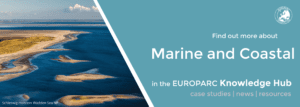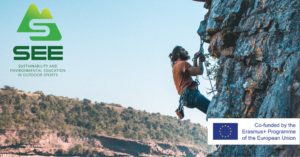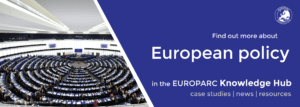Case study: Guide to good behaviour in the marine environment
Photo: Guadeloupe National Park
On this World Ocean Day, we want to share a good practice from our network. One of EUROPARC’s oversees members, the Guadelope National Park, created a guide to good behaviour in order to enhance sustainability of all the activities carried out in their marine protected natural space. Get inspired by their initiative!
Ensuring sustainable & respectful marine outdoor sports
The main mission of the Guadeloupe National Park is to preserve the marine and terrestrial ecosystems located on its territory. Good behaviour and respect of the park’s regulations are necessary conditions for the sustainable exercise of any activity that takes place in this Protected Area.
That’s why the National Park, together with its partners, created a new guide to good behaviour, intended for all users of the marine areas of the National Park.
Read the original case study: Good behaviour in the marine environment: Guadeloupe National Park.
It could be perceived that outdoor sports in the marine environment do not generate such a disturbing effect on the biodiversity present in and around the water, either because of the enormous size of the seas and oceans, or because of the lesser direct contact with the land (in this case the seabed). However, this is not entirely true. The development and promotion of many aquatic activities leads to a clear increase in pressure on marine areas, which are already among those most affected by climate change, especially near the tropics. That is exactly the case in Guadeloupe.
Uncoordinated aquatic activities might generate an impact on species not only under water but also on the surface, such as birds.
Also, in order to carry out some activities such as diving, the transport is done in boats that produce noise, pollute and can destroy the sea bed with their mooring systems.
In response to this situation, it is necessary to communicate and demand responsible and respectful behaviour towards the marine environment from all its users, but especially from professional operators who use the Protected Area to offer their services and develop their activities.
Solutions and actions taken
To tackle the issue, the Park established a system of authorizations for actors who carry out a professional activity inside the Protected Area. These partners were then required to sign agreements through which they commit to respect the Park’s instructions regarding the areas where to operate, as well as rules of behaviour that must be integrated and understood. In order to do this, a benchmarking campaign selected the most suitable operators to work in the area.
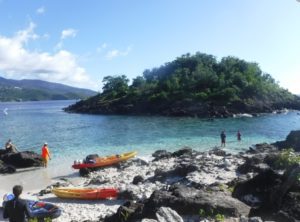
Photo: Guadeloupe National Park
The Park created a guide of good behavior, addressed to the general public and compulsory to adhere to for partners authorised to operate in the Marine Protected Area. The set of rules covers a number of sporting activities, with a strong focus on respect for local biodiversity.
Read the set of rules below or download the National Park’s brochure in French!
Eco-responsible behaviour
- bring back my garbage and other people’s garbage
- do not make a fire on the ground
- be quiet
- do not use disposable cutlery
- do not discharge washing and food water
- do not empty grey and black water tanks
- do not feed or disturb the animals
- do not take or manipulate the flora
- respect the whale-watching charter
- do not carry out maintenance work of the vessel at sea
Behaviours related to navigation and anchoring
- have a clean, well-trimmed and serviceable vessel
- limiting greenhouse gas emissions and noise and odour pollution as much as possible
- reduce the speed to 5 knots within 300m of the coastline and mangroves
- use the anchorages
- around the islets (except Pigeon islets), moor the boats (after disembarking passengers) more than 10 meters from the shore (swimming area)
- use anchors only on sandy or muddy areas, anchor and chain outside of meadows – under no circumstances should the mooring line be used in areas of sea grass or coral formations
- do not shift the anchor but raise it vertically
- do not sail in shallow areas where the propellers may damage the seabed
Snorkeling, diving and swimming activities
- do not to touch the fauna and flora
- do not have contact with turtles
- do not to take live or dead animals or plants (e.g. shellfish)
- stay away from bird nests and resting places
- avoid contact with the bottom outside sandy areas
- make a very moderate use of flash and Led lighting and avoid flashing the eyes of animals
- avoid repeated and prolonged passages under overhangs and in caves
- pick up any rubbish discovered
Kayak and sea biking activities
- gather the boats on the beach so as not to clutter up the space.
- keep a reasonable distance from the birds so as not to disturb them
Bird Discovery Activities
- approaching bird resting places and colonies obliquely to the shore at very slow speed and without noise
- limit the approach distance to 50 m
- avoid parking for too long (no more than 10 minutes).
- circulate silently or quietly on the edge of the mangrove swamps
- report any special observations to the national park, such as: unusual, rare or uncommon birds; banded or tagged bird; special behaviour or endangered or distressed bird.
This activity, which may seem insignificant, is not without consequences on the installation of the breeding couples or the success of their broods, as some species do not tolerate well the disturbances. Untimely or repeated disturbances may discourage some birds from returning to nest on the site the following season. They can also have a direct impact on the survival of eggs or chicks that, without parental protection, are vulnerable to predators and sunstroke. On the resting places, regular disturbance of the birds imposes on them an unnecessary expenditure of energy damaging their metabolism, just as it can disturb the preparation of their plumage (drying, oiling…) essential to their survival.
Landing on the islets
- check that there are no “stowaway” animals on board (rats, lizards, young iguanas, frogs, mice, etc.)
- check the passengers’ bags
- Avoid beaching; if it is essential for the time being, do it only in areas of bare sand
- avoid trampling on vegetation
- limit the walking approach distance to 150 m from resting places and bird colonies
Challenges for the project
While implementing the project, the National Park encountered several challenges. One of the issues is the (im)possibility of extending the licensing and control system to the general public. Also, there is a great difficulty in making understand actors, who were already present in the area before the establishment of the natural park, the importance of respectful practices.
The main lesson learned is the need to convince everyone of the necessary integration of good behaviour, as well as to make all stakeholders endorse it and work with it on a daily basis.
To overcome these challenges, the Park has started developing a transversal project that includes a complete action plan around outdoor sports. One of the aspects of this new project are the schemes for reinvesting funds to finance the restoration of marine spaces.
Take action for Sustainability and Environmental Education in Outdoor Sports!
Do you want to contribute to making the outdoor sports sector more sustainable and respectful to the environment? Goood news: We extended the deadline of our survey on outdoor sports in Protected Areas for those who haven’t filled it yet. It is available in 4 languages and takes about 15 minutes. For further information and updates, follow EUROPARC’s involvement in the ERASMUS+ SEE project, focussing on Sustainability and Environmental Education in Outdoor Sports.
Sustainable Tourism Training for Tomorrow: REGISTER NOW for the event!
How can we upskill to ensure a sustainable tourism offer that is good for people, good for business and good for nature in the Covid world?
- Thursday 17TH JUNE 2021
- 09:00-13:00 CET
- Free, but registration is required!
This conference will bring the conclusions of the Erasmus + project “Sustainable Tourism Training for Tomorrow”. You can find out more and join the learning platform here.
Sustainable Tourism is at a crossroads. With the focus on safe and nature-based tourism in demand following the covid pandemic, the sector is challenged to communicate its offers, address new markets and deliver a value-based offer.
As such, those working to deliver sustainable tourism need to stay up to date with new ideas and skills that will enable them to be fit for multiple purposes.
The Erasmus + project “Sustainable Tourism: Training for Tomorrow”, has been working for 3 years building an introductory learning platform. Based on EUROPARC’s Charter for Sustainable Tourism in Protected Areas, it is full of best practice case studies, knowledge resources, video and quizzes as well as a trainer’s toolkit that will stimulate all to build their sustainable tourism understanding and practice.
The conference will bring in current thinking from sustainable tourism policy and practice to help us consider what we need to do to ensure we have a viable sustainable tourism sector that is part of living working and protected landscapes across Europe.
REGISTER HERE
Draft Programme – Times are approximate
09.00 CET Scene setting
Where in the world are we with Sustainable Tourism?
Carol Ritchie Executive Director EUROPARC Federation
A global perspective on sustainable tourism and the need for skills and capacity building
Anna Spenceley CEO STAND Ltd; Chair IUCN WCPA Tourism and Protected Areas Specialist Group; Director, Global Sustainable Tourism Council
What are Sustainable Tourism training needs? A quick overview of Sustainable Tourism Training for Tomorrow analysis
Elke Hermans, Hasselt University.
How will Sustainable Tourism help deliver the Green Deal? EU policy framework on sustainable tourism, in light of the Green Deal
Cláudia MONTEIRO DE AGUIAR (PT) MEP, Committee of Transport and Tourism; Rapporteur for the EP document “Establishing an EU Strategy for Sustainable Tourism” (approved March 2020)
Making Sustainable Tourism work in the Regions
Manuel Alejandro Cardenete Flores (ES/RE), Rapporteur CoR Opinion “Towards more sustainable tourism for EU cities and regions”, CoR – Committee NAT (nature)
Deputy Minister for Tourism, Regeneration, Justice and Local Administration of the Regional Government of Andalusia
10.25 BREAK
Growing Sustainable Tourism in the post Covid world: Taking care of Business .
Ramune GENZBIGELYTE-VENTURI, Policy officer- Tourism Unit, DG GROW, European Commission
Sustainable Tourism; Taking care of Nature. Guidance for nature conservation sites for Sustainable Tourism
Sofia Pachini, Policy Officer, Nature Unit, DG Environment, European Commission
The value of training through Erasmus
Alessandro SENESI, Deputy Head of Unit, European Commission – Directorate-General for Education, Youth, Sport and Culture – Youth, Education and Erasmus+ – Erasmus+ Coordination
Training for Tomorrow
Introducing the STTFT learning platform
Elke Hermans, Veerle Cops. Hasselt University
11.20 BREAK
Tourism business are the backbone of Sustainable Tourism, how are they training for tomorrow, today?
Amanda Guzmán, Director of the Ecotourism in Spain Association.
Sustainable Tourism in the Parks
Two project partners: Montagne de Reims Regional Nature Park in France and Parchi Del Ducato, ENTE DI GESTIONE PER I PARCHI E LA BIODIVERSITA’ EMILIA-OCCIDENTALE, Italy – how training factors into their plans for sustainable tourism
Questions from audience to table of speakers & Audience interaction: What is your experience? How are you training for tomorrow?
Where do we go from here?
Fernando Correia, Hull University
Conclusions and Recommendations
13.00 END
This event is powered by:

Outcomes of the Seminar Dialogue 2021
This year’s edition of the Seminar Dialogue took place on the 1st of June, once again online due to restrictions still presented by the COVID-19 pandemic. The annual policy event was organized in collaboration with DG ENV, with the participation of DG AGRI.
Discussing the Biodiversity Strategy with European Commission
Following the successful Seminar-Dialogues organised in 2017, 2018, 2019, and 2020, on the 1st of June 2021 around 50 representatives of the EUROPARC Federation members from all Europe had a new chance to dialogue with the European Commission.
Seminar Dialogue’ is an opportunity to give a voice to nature within the European commission and highlight the importance of Protected Areas.
This year the event was focused on targets, criteria, guidelines, and funds for the implementation of the EU Biodiversity Strategy 2030, and the role of the Protected Areas.
The EU Biodiversity Strategy foresees a large role for Protected Areas. During the Seminar Dialogue 2021 EUROPARC Members heard directly from the European Commission on the different Protected Area and Restoration targets, criteria and its implementation.
Review the agenda of the event:
And download the full report with all the presentations:
During the debate, participants had the opportunity to participate in polls and to express their comments in a “virtual” board: You can see the results here:
In the online poll, the participants were asked to answer the following question: If you had sufficient resources to take forward the implementation of the EU protected area targets, what would your main investment be in?
This is the outcome of the poll:
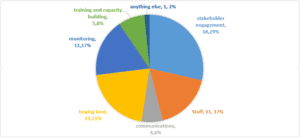
EUROPARC thanks very much the European Commission and all speakers and participants for the time, ideas, information, knowledge, experiences they shared during the event. Due to the restrictions still presented by the COVID-19 pandemic, the Seminar Dialogue 2021 took place online, but we are confident to meet next year again face-to-face!
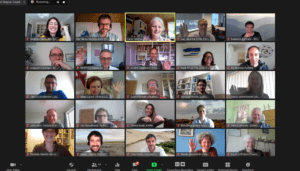
Download the presentations:
F.VASSEN PRESENTATION J.CAPITAO PRESENTATION
L.REYRINK & A.CLASSEN PRESENTATION L.SAMARELLI PRESENTATION
P.OGINSKI PRESENTATION C.McCAMPHILL PRESENTATION
D.GENTILE PRESENTATION F.MINOZZI PRESENTATION
About the Seminar Dialogue
The Seminar Dialogue is an annual event organized by EUROPARC in collaboration with the Unit “Nature” of Direction General Environment (DG ENV), European Commission. By bringing together representatives of the European Commission and Protected Area professionals, EUROPARC aims to highlight the contribution of Protected Areas to the achievement of the European policy goals, whilst giving the European Commission a clear insight of the challenges faced by professionals in the field.
Keep an eye on our Policy updates and see you in Brussels for the Seminar Dialogue 2022!
SAVE THE DATE: EUROPARC Online Conference 2021
The EUROPARC Conference is the event of the year for those working in Europe’s Protected Areas and Natura 2000 sites.
EUROPARC Conference in Leeuwarden postponed to 2023

It is with regret that the hosts of EUROPARC 2021 together with the EUROPARC Federation announce the decision to cancel the conference that was planned for October 2021 and to postpone it to 2-6 October, 2023. Due to the Covid-19 pandemic there are currently too many insecurities to organise a successful event this year. We had been very much looking forward to welcoming colleagues from all over Europe in The Netherlands but since the conference is not cancelled, but postponed, we hope to see you all in good health in October 2023!
Sadly, as has just been announced, our face to face conference in the Netherlands has fallen victim to the stringent regulations required and we have had to postpone it. We look forward to reconvening in 2023.
Parks in the Spotlight: Powered by People, Inspired by Nature
However, building on the success of our first online conference last year, we are delighted to be able to announce a new EUROPARC ONLINE conference 2021 Parks in the Spotlight Powered by People; Inspired by Nature, will be on 6th and 7th October, in your very own living room, bedroom, dining room or office! Wherever you can access from your phone or computer, we will be there with you.
In many global and European policy frameworks Parks and Protected Areas have finally been identified as having a significant role. So, at this moment Parks are in the “Spotlight” across multiple agendas. This is our chance to “shine” and highlight how things are achieved “on the ground” and to indicate what more is needed to enable parks and Protected Areas to fulfil their potential and meet the challenges being presented.
Our conference will look at the practical management that turns political and societal topics, such as climate change, biodiversity restoration, health, tourism and economy (especially post covid), capacity building, technology, role of youth and agriculture into reality.
Inspired by Nature, it is the People of Parks, the staff, their communities, partners and stakeholders that make the changes needed, happen.
We invite you to SAVE THE DATES and we will announce more programme details and be open for registration in the coming months.
